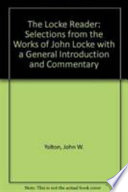 The power that is in any body, by reason of the particular constitution of its primary qualities, to make such a change in the bulk, figure, texture, and motion of another body, as to make it operate on our senses, differently from what it did before.... The power that is in any body, by reason of the particular constitution of its primary qualities, to make such a change in the bulk, figure, texture, and motion of another body, as to make it operate on our senses, differently from what it did before....  The Life of John Locke - Page 111by Henry Richard Fox Bourne - 1876Full view The Life of John Locke - Page 111by Henry Richard Fox Bourne - 1876Full view - About this book
 | Philosophers - 1912 - 770 pages
...several colours, sounds, smells, tastes, &c. These are usually called sensible qualities. Thirdly. The power that is in any body, by reason of the particular...power to make wax white, and fire, to make lead fluid. [These are usually called powers.] The first of these, as has been said, I think may be properly called... | |
 | St. George William Joseph Stock - Philosophy, English - 1912 - 246 pages
...several colours, sounds, smells, tastes, etc. These are usually called Sensible Qualities. " Thirdly, the power that is in any body, by reason of the particular...power to make wax white, and fire to make lead fluid. These are usually called Powers " (II. viii., §23). In a subsequent passage the power to receive alterations... | |
 | John Locke - Knowledge, Theory of - 1924 - 438 pages
...several colours, sounds, smells, tastes, &c. These are usually called s&isible qualities. TJlirdly, the power that is in any body, by reason of the particular...constitution of its primary qualities, to make such a 1 If theconstitution of the insensible parts were perceptible (if we had ' microscopical nye!j '),... | |
 | John Locke - Knowledge, Theory of - 1928 - 428 pages
...several colours, sounds, smells, tastes, &c. These are usually called sensible qualities. Thirdly, the power that is in any body, by reason of the particular...power to make wax white, and fire to make lead fluid. These are usually called powers. The first of these, as has been said, I think, may be properly called... | |
 | John W. Yolton - Philosophy - 1970 - 260 pages
...cause us to see colour, have smells, tastes, etc., and (c] powers which are the abilities a body has 'by reason of the particular constitution of its primary...on our senses differently from what it did before' (2.8.23). An alternate vocabulary for (b) and (c) is, respectively, secondary qualities immediately... | |
 | John W. Yolton - Philosophy - 1977 - 364 pages
...several colours, sounds, smells, tastes, &c. These are usually called sensible qualities. Thirdly, the power that is in any body, by reason of the particular...power to make wax white, and fire to make lead fluid. These are usually called powers. The first of these, as has been said, I think, may be properly called... | |
 | H. von Helmholtz - History - 1977 - 262 pages
...insensible parts, as colours, sounds, tastes, etc." (§10). The third kind are powers in a body to change "the bulk, figure, texture, and motion of another...on our senses differently from what it did before" (§23). Locke also complains (as Helmholtz will below) that the similarity between the second and third... | |
 | Geoffrey Scarre - Philosophy - 1988 - 262 pages
...there is a palpable omission here, for it omits those powers by which one body operates upon another; thus the sun has a power to make wax white, and fire to make lead fluid (M'Cosh, p. 118; quoted at EH, p. 201). In a similar vein, WH Smith asserted that 'The qualities by... | |
 | Anna-Teresa Tymieniecka - Philosophy - 1994 - 328 pages
...and thereby produce in us the different ideas of several Colours, Sounds, Smells, Tasts, etc.” 3) “The Power that is in any Body, by Reason of the...our Senses, differently from what it did before.” 9 These three sorts of qualities are called “primary qualities,” “secondary qualities,” and,... | |
| |